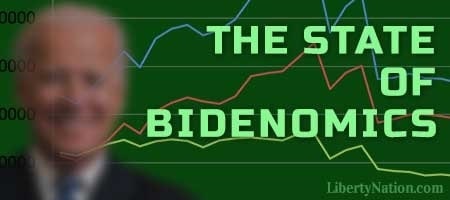Bidenomics – the economic doctrine of former President Joe Biden meant to cure everything that ails the US economy – has given the country a credit downgrade for the first time in more than a decade. In fact, the last time such a rare event occurred was when Barack Obama was the president. Financial markets are spooked, the White House is in denial, and the public might just shrug. Despite the black eye to the federal government, the current administration still intends to borrow $1 trillion in the third quarter to fund Bidenomics.
Bidenomics and a Credit Downgrade
Fitch Ratings blindsided everyone on Aug. 1 when it announced that it downgraded the US long-term foreign-currency issuer default rating from AAA to AA+. Washington has maintained this stellar Fitch rating since 1994. The agency alluded to “expected fiscal deterioration over the next three years,” plus an increasing general debt burden, unaddressed fiscal challenges, and an erosion of governance. The move came three months after Fitch placed the country’s AAA rating on negative watch and represented the first downgrade from a rating agency since 2011, when Standard & Poor’s trimmed the country’s credit rating from AAA to AA+.
“The repeated debt-limit political standoffs and last-minute resolutions have eroded confidence in fiscal management,” Fitch stated. “In Fitch’s view, there has been a steady deterioration in standards of governance over the last 20 years, including on fiscal and debt matters, notwithstanding the June bipartisan agreement to suspend the debt limit until January 2025.”
Fitch also listed the expanding general government deficit, which is expected to grow to 6.3% of the gross domestic product this year, up from just 3.7% last year. It noted that the reductions in non-defense discretionary spending outlined in the Fiscal Responsibility Act provide “only a modest improvement to the medium-term fiscal outlook.”
Looking ahead, Fitch anticipated a “mild” recession in the fourth quarter of 2023 and the first quarter of 2024 due to a blend of tightening credit conditions, a slowdown in consumption, and deteriorating business investment. Indeed, the Federal Reserve’s second-quarter Senior Loan Officer Opinion Survey (SLOOS) confirmed that financial institutions were pulling back lending and reporting weaker loan demand amid higher interest rates and the banking turmoil this past spring.
Lesson Learned?
 Despite Fitch’s warnings, the Treasury Department will still continue to seek to borrow $1 trillion in the third quarter, the largest amount ever for the July-September period. This was also $274 billion more than the initial spring estimate. Looking ahead to the fourth quarter, the Treasury plans to borrow $852 billion, suggesting that officials expect the budget deficit to worsen for the 2023 and 2024 fiscal years. So far, the Fitch downgrade might not impact these efforts because of how liquid Treasurys remain. That said, Barclays strategists described the situation best in an Aug. 1 research note, saying that the “Treasury’s latest financing estimates point to a worsening fiscal profile,” adding that it would not be surprising if these issuances were closer to $2 trillion next year.
Despite Fitch’s warnings, the Treasury Department will still continue to seek to borrow $1 trillion in the third quarter, the largest amount ever for the July-September period. This was also $274 billion more than the initial spring estimate. Looking ahead to the fourth quarter, the Treasury plans to borrow $852 billion, suggesting that officials expect the budget deficit to worsen for the 2023 and 2024 fiscal years. So far, the Fitch downgrade might not impact these efforts because of how liquid Treasurys remain. That said, Barclays strategists described the situation best in an Aug. 1 research note, saying that the “Treasury’s latest financing estimates point to a worsening fiscal profile,” adding that it would not be surprising if these issuances were closer to $2 trillion next year.
Still, according to the current administration, Fitch was not worried about Washington’s “fiscal deterioration” but rather about Republicans.
Bah, Humbug!
The White House was none too pleased by the recent decision, choosing to pin the blame on the “extremism” by Republican officials.
“The ratings model used by Fitch declined under President Trump and then improved under President Biden, and it defies reality to downgrade the United States at a moment when President Biden has delivered the strongest recovery of any major economy in the world,” said Press Secretary Karine Jean-Pierre in a statement. “And it’s clear that extremism by Republican officials — from cheerleading default, to undermining governance and democracy, to seeking to extend deficit-busting tax giveaways for the wealthy and corporations — is a continued threat to our economy.” Senate Majority Leader Chuck Schumer (D-NY) also took the opportunity to blame House Republicans for Fitch’s credit downgrade.

Janet Yellen (Photo by Erika Goldring/Getty Images FOR ESSENCE)
Speaking at an Internal Revenue Service contractor office on Aug. 2, Treasury Secretary Janet Yellen said it was “entirely unwarranted” as Fitch refused to accept improvements in government metrics and the nation’s economic strength. “Fitch’s decision is puzzling in light of the economic strength we see in the United States. I strongly disagree with Fitch’s decision, and I believe it is entirely unwarranted,” Yellen told reporters. “At the end of the day, Fitch’s decision does not change what all of us already know: that Treasury securities remain the world’s preeminent safe and liquid asset, and that the American economy is fundamentally strong.”
Opinions in the private sector were mixed. JPMorgan Chase CEO Jamie Dimon called it “ridiculous,” noting in an interview with CNBC that it “doesn’t really matter.” He added: “They point out some issues which we all knew about.” However, Peter Schiff, the chief economist at Euro Pacific Capital, agrees that it was meaningless but for a different reason. “#Fitch downgrading U.S. Treasuries to AA+ from AAA is meaningless, as Treasuries are junk bonds,” he tweeted. “When it comes to rating sovereign credit, the primary risk is currency depreciation, not default. Given the trajectory of U.S. Govt. deficit spending, a dollar collapse is inevitable.”
Whatever the case, Wall Street took the downgrade seriously enough. The Dow Jones Industrial Average and the Nasdaq Composite Index tanked as much as 300 points, while the S&P 500 slumped more than 1%. Gold, silver, crude oil, and cryptocurrency tumbled, too. The US Treasury market was mixed, with the benchmark ten-year yield climbing about three basis points to above 4.08%. The US Dollar Index (DXY), a safe-haven gauge of the greenback against a basket of currencies, posted modest gains.
Does It Matter to You?
The Fitch downgrade is unlikely to have any lasting impact on household budgets or the broader economy, although it could affect borrowers for states and local governments that rely on federal funding. But, for the most part, Jane Doe and John Smith will not be harmed. Of course, it does signal that Bidenomics is not the miracle cure President Biden and his disciples think it is. From soaring debt to half the nation living paycheck to paycheck and now a credit downgrade, serious and non-partisan historians likely won’t look back at Bidenomics with great nostalgia.




